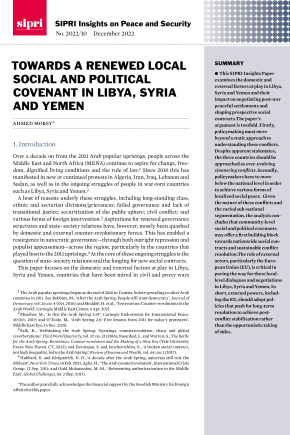Towards a Renewed Local Social and Political Covenant in Libya, Syria and Yemen
This SIPRI Insights Paper examines the domestic and external factors at play in Libya, Syria and Yemen and their impact on negotiating post-war peaceful settlements and shaping prospective social contracts. The paper’s argument is two-fold. Firstly, policymaking must move beyond a static approach to understanding these conflicts. Despite apparent stalemates, the three countries should be approached as ever-evolving simmering conflicts. Secondly, policymakers have to move below the national level in order to achieve various forms of localized social peace. Given the nature of these conflicts and the varied sub-national segmentation, the analysis concludes that community-level social and political covenants may offer a first building block towards nationwide social contracts and sustainable conflict resolution. The role of external actors, particularly the European Union (EU), is critical in paving the way for these local-level dialogues and negotiations in Libya, Syria and Yemen. In short, external powers, including the EU, should adopt policies that push for long-term resolution to achieve post-conflict stabilization rather than the opportunistic taking of sides.
I. Introduction
II. Local social and political covenants: A possible way forward?
III. Zooming in: Libya, Syria and Yemen
IV. Zooming out: Localized covenants, simmering stalemates and external actors
V. Conclusions and recommendations

